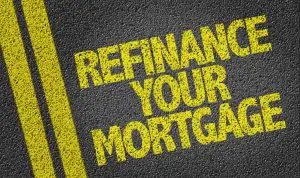 Refinancing a mortgage is a process that involves paying off a current mortgage loan and replacing it with a new mortgage loan. While there are several different refinance options, many homeowners consider a no cash-out refinance.
Refinancing a mortgage is a process that involves paying off a current mortgage loan and replacing it with a new mortgage loan. While there are several different refinance options, many homeowners consider a no cash-out refinance.
What is a No Cash-Out Refinance?
A no cash-out mortgage is a method for refinancing an existing mortgage for an amount equal to or less than the current loan balance. This type of mortgage refinance is considered a rate and term refinance as it focuses on adjusting the rate and terms of a homeowner’s existing mortgage loan. No cash-out refinance loan may also shorten or lengthen the duration of the loan based on the borrower’s needs.
Why Do Borrowers Use No Cash-Out Refinance Mortgages?
There are several scenarios in which a no cash-out refinance mortgage is a smart choice for homeowners. Refinancing is suitable for:
- Reducing monthly payments or interest rates.
- Consolidating mortgages into one, locking in a more favorable interest rate.
- Eliminating upfront costs by rolling closing, financing, and related prepaid items into a new loan.
Advantages of No Cash-Out Refinancing Mortgages
Refinancing is a big financial decision. However, in the right circumstance, refinancing can be beneficial for homeowners.
Lowering Monthly Mortgage Payments
Occasionally a homeowner’s work or life circumstances can change, leaving them struggling to meet monthly mortgage payments. No cash-out refinancing can help lower the monthly amount by extending the length of the mortgage.
However, extending the length of a mortgage may mean that the borrower pays more interest than they would on their current loan.
Change of Terms
Refinancing allows homeowners to replace their existing mortgage with a new loan that offers better terms, such as lower interest rates or a preferable loan term.
Change of Lenders
Refinancing allows homeowners to change lenders if desired.
Disadvantages of No Cash-Out Refinancing
While there are significant benefits to no cash-out refinancing, there are also disadvantages.
Extending Loan Terms
Sometimes, refinancing can be a good way for homeowners to get better terms on a mortgage or help relieve current financial trouble. However, if refinancing at a longer term, homeowners may find themselves in a lifetime of debt.
Not All Refinancing Saves Money in the Long-Term
Some homeowners believe that they will save money over time if they refinance to lower the interest rate. However, if refinancing at a similar or longer term than the current mortgage, homeowners may end up paying more interest over the life of the loan.
No Cash Advance
A popular reason to refinance a mortgage is to access built-up home equity. Homeowners can use home equity to make improvements to their current home or pay off other debts. A no cash-out refinance does not give homeowners cash in return.
How to Qualify for a No Cash-Out Refinance?
To qualify for a no cash-out refinance mortgage, homeowners must meet specific requirements, such as debt to income ratio, equity in their homes, and an acceptable credit score.
Credit Score
Credit scores play a significant role in qualifying for a no cash-out refinance.
Homeowners should check their credit score before applying for a refinance. When getting preapproved for a refinance, homeowners will receive a hard inquiry on their credit report. Hard inquiries can often lower credit scores by several points. If the credit score falls below the mortgage loan requirements, this could affect homeowners from getting approved.
Related: 6 Simple Ways to Raise Your FICO Credit Score
Debt-to-Income Ratio
A borrower’s debt-to-income ratio (DTI) is another deciding factor in accessing a mortgage. If a homeowner has taken on a lot of debt or the household income has fallen, it can affect their eligibility for a refinance.
Available Home Equity
The amount of home equity a homeowner has can affect their eligibility for a no cash-out refinance. If homeowners request to borrow 80% of their home value, they may need to pay private mortgage insurance (PMI). In addition, many lenders require homeowners to have at least 20% home equity before allowing a refinance mortgage.
Related: 4 Ways to Save Money and Build Home Equity at a Faster Pace
Conclusion
A no cash-out refinance provides borrowers with the option to refinance their home with a loan for what they still owe on their current mortgage, plus any closing costs associated with the new mortgage.
While other mortgage loans allow homeowners to access built-up equity, no cash-out refinancing does not offer a cash benefit.
No cash-out mortgage refinancing offers many benefits to homeowners looking to refinance, but it is important to research before making any financial decision.
Marimark Mortgage
Marimark Mortgage is based in Tampa, Florida, and serves the mortgage needs of homebuyers, homeowners, and investors in Florida, Virginia, and Pennsylvania.
We specialize in mortgages for first-time homebuyers, conventional home mortgages, refinance loans, reverse mortgages, and FHA, VA, and USDA mortgage options. We’ve worked extensively with cash-out refinancing and help clients to lower their monthly mortgage payments.
To get started with a mortgage to buy your next home, please fill out our Quick Mortgage Application or contact us.

The Marimark Mortgage Newsletter will keep you informed with important events in the mortgage industry that could impact your finances.
We especially focus on ways to save money on your current and future mortgages. And, we continually share the information we share with our clients, because we believe informed consumers are the best consumers.
Real estate agents, and other professionals in the industry, will receive an ongoing wealth of information that will help them serve their clients.